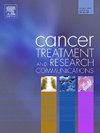Therapy gone viral: Exploring the use of oncolytic viruses in non-small cell lung cancer immunotherapy
IF 2.4
Q3 Medicine
引用次数: 0
Abstract
Non-small cell lung cancer is a significant cause of cancer-related death worldwide. Current treatment modalities for advanced-stage non-small cell lung cancer can be intrusive, with limited efficacy and unfavourable side effect profiles. However, oncolytic viruses can be used to specifically target and kill cancer cells. These viruses cause cancer cells to self-destruct and trigger the body's immune response against the cancer. Many preclinical studies observed activation of an immune response, resulting in decreased tumour mass. However, translating these preclinical results to clinical studies has proved challenging. These treatments have shown improved side effect profiles in clinical trials, but many have failed to show statistical significance for improved efficacy. The primary objective of this review was to critically appraise studies to assess the potential benefits and clinical applications of oncolytic viral therapy to treat non-small cell lung cancer. Secondary aims included evaluating optimal delivery methods and considering adjuvant cancer therapies. Collaborative efforts and clinical trials are essential to optimise oncolytic virus combination therapies.
病毒疗法:探索溶瘤病毒在非小细胞肺癌免疫治疗中的应用
非小细胞肺癌是世界范围内癌症相关死亡的重要原因。目前晚期非小细胞肺癌的治疗方式可能是侵入性的,疗效有限且副作用不良。然而,溶瘤病毒可以用来特异性地靶向和杀死癌细胞。这些病毒导致癌细胞自我毁灭,并触发人体对癌症的免疫反应。许多临床前研究观察到免疫反应的激活,导致肿瘤体积的减少。然而,将这些临床前结果转化为临床研究证明是具有挑战性的。这些治疗方法在临床试验中显示出改善的副作用概况,但许多治疗方法未能显示出改善疗效的统计学意义。本综述的主要目的是对溶瘤病毒治疗非小细胞肺癌的潜在益处和临床应用进行批判性评价。次要目的包括评估最佳递送方法和考虑辅助癌症治疗。协作努力和临床试验对于优化溶瘤病毒联合疗法至关重要。
本文章由计算机程序翻译,如有差异,请以英文原文为准。
求助全文
约1分钟内获得全文
求助全文
来源期刊

Cancer treatment and research communications
Medicine-Oncology
CiteScore
4.30
自引率
0.00%
发文量
148
审稿时长
56 days
期刊介绍:
Cancer Treatment and Research Communications is an international peer-reviewed publication dedicated to providing comprehensive basic, translational, and clinical oncology research. The journal is devoted to articles on detection, diagnosis, prevention, policy, and treatment of cancer and provides a global forum for the nurturing and development of future generations of oncology scientists. Cancer Treatment and Research Communications publishes comprehensive reviews and original studies describing various aspects of basic through clinical research of all tumor types. The journal also accepts clinical studies in oncology, with an emphasis on prospective early phase clinical trials. Specific areas of interest include basic, translational, and clinical research and mechanistic approaches; cancer biology; molecular carcinogenesis; genetics and genomics; stem cell and developmental biology; immunology; molecular and cellular oncology; systems biology; drug sensitivity and resistance; gene and antisense therapy; pathology, markers, and prognostic indicators; chemoprevention strategies; multimodality therapy; cancer policy; and integration of various approaches. Our mission is to be the premier source of relevant information through promoting excellence in research and facilitating the timely translation of that science to health care and clinical practice.
 求助内容:
求助内容: 应助结果提醒方式:
应助结果提醒方式:


